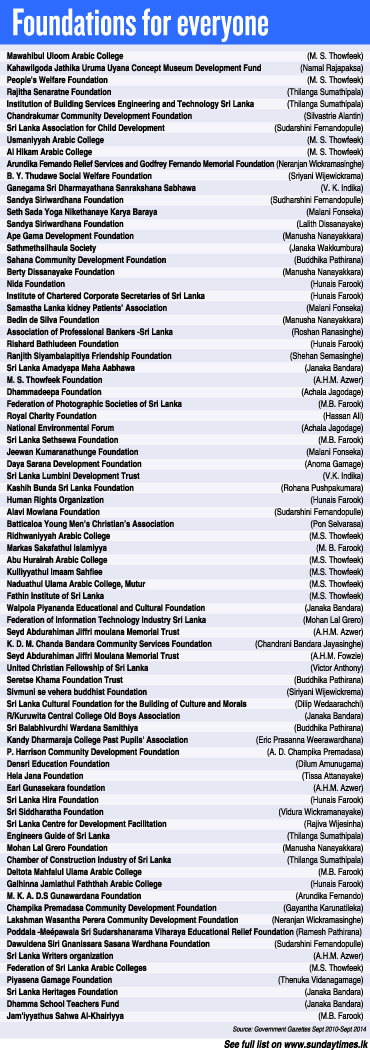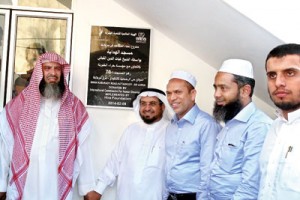News
Monitoring of Foundations coming
Foundations: Everybody seems to want one and the most popular way of setting it up is through Parliament, by way of a Private Member’s Bill. The procedure is so simple that there has been a steady growth in the number of proposals submitted for approval. Last month alone, five incorporation Bills were gazetted for consideration by the House. There are more to come.

Click to visit foundations for everyone
Not all Bills relate to foundations, although they make up the vast majority. Some are for the incorporation of colleges, trusts, organisations and associations; of institutes, councils, societies and other charities. Once passed in Parliament, they not only gain a degree of prestige and credibility, they are permitted to receive and spend foreign funds. They are responsible for their own audits and presumably report to their donors.
The number of existing organisations is so large that it is not possible to generalise about how they operate. Some have boards, some do not. Some are small in scope while others are bigger. Some are professionally run according to internal procedures and constitutions, others are not. A few are even registered with the National Secretariat for Non-Governmental Organisations.
Those named after Ministers or Parliamentarians are typically designed to boost their political profile. And one of the fastest-growing sectors is religious schools, as is evident from the list printed with this article (extended version is published online).
They often have broad, vague objectives. For instance, one foundation aspires to “develop peace and unity among the nation”. It also wishes to “enhance financial, political, educational, cultural and social affairs through developing international affairs”, which makes no sense at all. Another wants to transform Sri Lanka into an alcohol free country. Many Arabic Colleges aim to create theologists to lead the community under the Islamic law of Sharia.
There is no central repository of information and data. Monitoring at district or provincial level, if any, is weak. There is no mechanism by which they report to the central Government. The Finance Ministry, while stressing that all foreign funds must be channeled through its External Resources Department, says it does not have information about the monies—origins, amounts or purpose— received by these groups. They may apply for tax exemptions. A senior official said there was a lacuna in the law and that the Central Bank was also addressing the issue.
The Ministry of Defence and Urban Development claims it will address the gap through amendments to the Voluntary Social ServiceOrganisations (Registration and Supervision) Act. A final copy has now been passed by the Legal Draftsman and will shortly be submitted to Cabinet, said Saman Dissanayake, Director of the NGO Secretariat.
Mr. Dissanayake said the Ministry will allow two weeks for public observations once other routine procedures were completed. The draft was discussed with relevant officials – including those from the Ministries of Justice and Social Services, State Intelligence and the Central Bank—but not with the NGO sector. “There is no need to ask the NGOs because this is a law that is being enacted in the interests of the country,” he said. He divulged some details. For instance, foundations and other bodies incorporated by Act of Parliament will have to register annually with the Secretariat or lose the right to receive foreign funds and conduct local monetary transactions. They will also have to submit reports and sign Memorandums of Understanding with the Government.
A change has already been introduced with regards to the incorporation of organisations in Parliament. The Cabinet Secretary, who receives Private Members’ Bills and submits them for the approval of Ministers, has started sending them to the NGO Secretariat for its observations.
And in a first sign of how it might be under new rules, the NGO Secretariat has questioned the motives of National List MP Rajiva Wijesinha’s proposal to incorporate the Sri Lanka Centre for Development Facilitation (SLCDF). The basis for their skepticism was that SLCDF was already registered as an NGO so it did not need incorporation. The Bill is still pending.

Aid from Saudi Arabia for projects undertaken by Deputy Minister Hisbullah’s Hira Foundation
Critics say the decision points to a subjectivity that is not based on clear criteria. There are many other NGOs that have been incorporated and vice versa. Why were objections raised speculatively about this one and without proof of wrongdoing? Will this be the trend?Mr. Wijesinha has written to Defence Secretary Gotabaya Rajapaksa saying the organisation was chaired for many years by his father, the late Sam Wijesinha. He told the Sunday Times that Parliamentary incorporation was sought “to facilitate formalities such as banking, if money comes in the present context”. It would also give the SLCDF gravitas with donors and potential partners in Sri Lanka.
Questions arise, therefore, about the reasons for which certain organisations might be rejected. Mr. Wijesinha himself supports “simple, straightforward, rigid regulations that nobody will disobey” along the lines that India has implemented. The Government must go through reports and accounts, he said.
Civil society has been openly critical and suspicious of the Government’s motives—and it does not help that the Ministry of Defence is involved. They fear the legal amendments are aimed at increased surveillance and militarisation as well as suppression of dissent. They predict that organisations working in human rights, accountability, governance and democracy will be targeted.
Mr. Dissanayake said they were concerned about groups that were not accountable to anyone. “There are plenty of people who will readily give money for activities to destabilise the country and the Government,” he said, in an earlier interview. “Foreign funds can be used for good purposes and bad purposes.”Some officials mentioned the US-funded voter education programme that ran into controversy and was cancelled after the Government protested. They referred to moves “to discredit the country internationally”. Other initiatives were also crippled in recent times, such as training in investigative journalism for Tamil language reporters.
It is true that some monitoring is necessary of organisations that work outside the ambit of any oversight body. It is also evident, however, that the real or imagined spectre of “Western-funded conspiracies” played a distinct role in upcoming changes to legislation.
| High rising foundationsThe Sunday Times combed through scores of gazettes from September 2010 to September 2014 to gauge just how many organisations were submitted for incorporation through Parliament. There were 161, working out to an average of 1.2 per month over four years. (Part of the list is published herewith with an extended version available online).This might seem conservative until Order Papers of Parliament are also perused. These contain a multitude of additional foundations, etc., listed for consideration. Not everything named in gazettes and order papers have been approved yet but they provide some insight into the scale of the phenomenon. Still more organisations are registered as non-profit companies under the Registrar of Companies.
Only Members of Parliament can introduce a Private Member’s Bill – not Ministers, Deputy Ministers or any other office bearers such as the Leader of the House or Chief Government Whip. Some MPs are noted for submitting Bills, as can be observed from the list. Manusha Nayakkara, Galle District UNP, has his own foundation and has helped set up others. He did not object to a financial regulation of the sector. “If its financial auditing the Government wants to do, I have no problem with it,” he said. “But it must not set our agenda and we must be able to decide our scope.” He admitted that the number of foundations has increased in recent times. Part of the reason may be political, with even many ministers setting up organisations in their name. There were also many rackets that the needed to be stopped. “I personally had an experience,” he said. “A foreigner spoke to me and said they have a one million dollar cheque. He even sent me a photo of it on Viber. He asked me whether I would take the money to my NGO with 60 percent for them and 40 percent for us.” “In the Galle district, there are a lot of foreigners who get involved with foundations,” he continued. “Some come on tourists visas with no job. They advertise abroad and collect funds. Then they show a few photos of a small project they did here. So I am not against financial oversight.” “If you accept foreign funds, it has to be accounted for somewhere,” she added. “Foundations can receive money directly from other countries. It is good to monitor what becomes of it.” Deputy Economic Development Minister M.L.A.M. Hisbullah has close ties with the Middle East. He channels funds from there into his Hira Foundation and has also sought Parliamentary incorporation for a new Hisbullah Foundation. Recently, he was in Kattankudy, in the East, to innaugrate the town’s 58th mosque that was built with donations from Saudi Arabia. Two Saudi “princes” also attended the ceremony along with two others from that country. Mr. Hisbullah was hesitant to comment on the proposed legal amendments saying he did not know what they were. “We are doing a lot of work for poor people through the foundations,” he said, in the hope that their activities will not be affected. Asked if he gets foreign funding, he replied: “Small, small amounts. We can give accounts, no issue.” |

